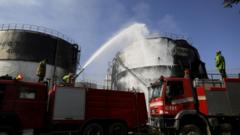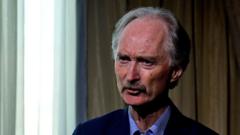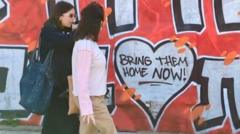The article delves into controversial claims made by Israel concerning the infiltration of Hamas into United Nations schools in Gaza, amidst a backdrop of militarism and humanitarian crises.
# Claims of Hamas Ties within UN Schools Stir Controversy in Gaza

# Claims of Hamas Ties within UN Schools Stir Controversy in Gaza
Allegations arise regarding Hamas operatives employed at UN-run schools, raising questions over neutrality amidst ongoing conflict.
In recent developments from Gaza, Israeli military documents reveal a concerning pattern involving employees of the United Nations Relief and Works Agency (UNRWA). Among those named is Ahmad al-Khatib, a deputy principal at a UN-operated elementary school in Khan Younis, who is allegedly linked to Hamas's military wing, the Qassam Brigades. According to the documents, he has been identified as an infantryman and has received various weapons.
This reveals a troubling chapter in the ongoing conflict, as the refugee agency, tasked with maintaining neutrality in volatile zones, now faces scrutiny. With the operational mandate of UNRWA covering a vast educational framework—288 schools across Gaza—these revelations have sparked substantial backlash. The Israeli government claims that the military wing of Hamas has deeply penetrated the educational system, citing that 24 UNRWA staff members are associated with militant groups.
Critical insights emerged regarding the responsibilities UNRWA bears in ensuring the safety of its educational environments. While Israel maintains that the United Nations has downplayed the presence of militants, the UN has rebuffed the allegations, accusing Israel of waging a campaign to undermine its credibility.
As the region grapples with escalating violence post-Hamas's October 7 attack on Israel, the implications of these findings extend beyond immediate accusations, potentially affecting humanitarian access and educational integrity. The discourse surrounding the allegations highlights the complexities of operating humanitarian infrastructure within conflict zones, prompting deeper analysis of accountability and the intertwining of education and militancy in the territory.
These evolving dynamics challenge perceptions on both the humanitarian front and security perspectives, emphasizing the need for balanced analysis amidst the chaos wrought by sustained conflict.
This reveals a troubling chapter in the ongoing conflict, as the refugee agency, tasked with maintaining neutrality in volatile zones, now faces scrutiny. With the operational mandate of UNRWA covering a vast educational framework—288 schools across Gaza—these revelations have sparked substantial backlash. The Israeli government claims that the military wing of Hamas has deeply penetrated the educational system, citing that 24 UNRWA staff members are associated with militant groups.
Critical insights emerged regarding the responsibilities UNRWA bears in ensuring the safety of its educational environments. While Israel maintains that the United Nations has downplayed the presence of militants, the UN has rebuffed the allegations, accusing Israel of waging a campaign to undermine its credibility.
As the region grapples with escalating violence post-Hamas's October 7 attack on Israel, the implications of these findings extend beyond immediate accusations, potentially affecting humanitarian access and educational integrity. The discourse surrounding the allegations highlights the complexities of operating humanitarian infrastructure within conflict zones, prompting deeper analysis of accountability and the intertwining of education and militancy in the territory.
These evolving dynamics challenge perceptions on both the humanitarian front and security perspectives, emphasizing the need for balanced analysis amidst the chaos wrought by sustained conflict.


















